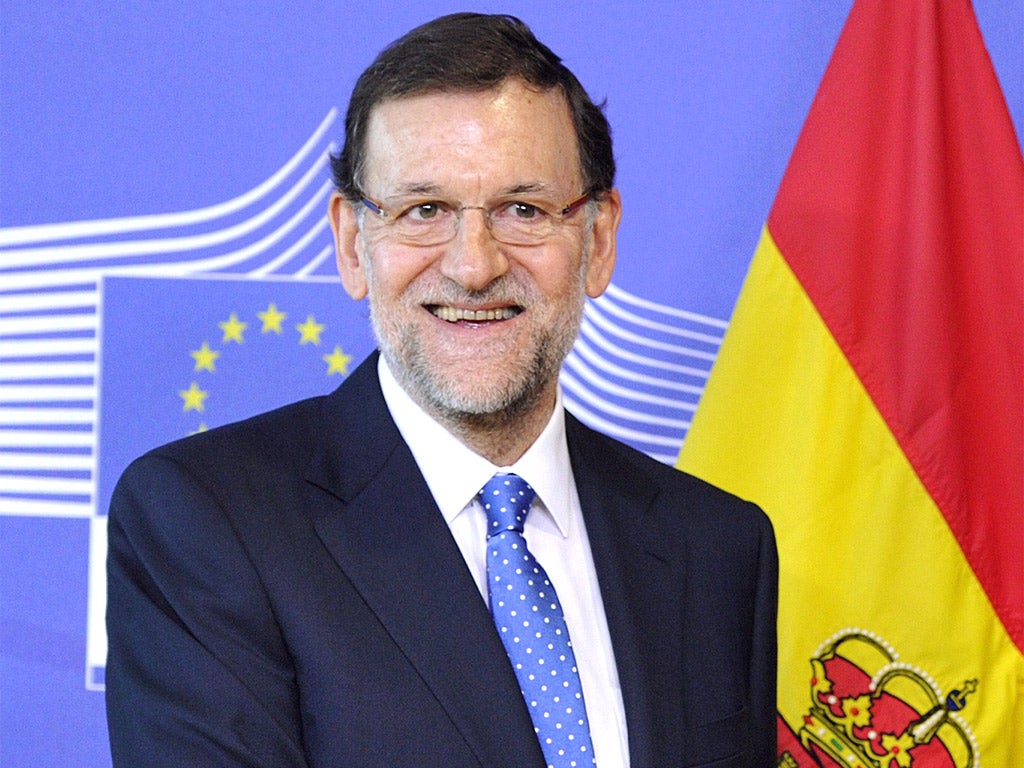Corrupt? I’m being blackmailed, says Spain’s embattled PM Mariano Rajoy in wake of slush fund allegations

Your support helps us to tell the story
From reproductive rights to climate change to Big Tech, The Independent is on the ground when the story is developing. Whether it's investigating the financials of Elon Musk's pro-Trump PAC or producing our latest documentary, 'The A Word', which shines a light on the American women fighting for reproductive rights, we know how important it is to parse out the facts from the messaging.
At such a critical moment in US history, we need reporters on the ground. Your donation allows us to keep sending journalists to speak to both sides of the story.
The Independent is trusted by Americans across the entire political spectrum. And unlike many other quality news outlets, we choose not to lock Americans out of our reporting and analysis with paywalls. We believe quality journalism should be available to everyone, paid for by those who can afford it.
Your support makes all the difference.Spanish Prime Minister Mariano Rajoy rejected calls to quit on Monday after his party’s former treasurer said in court he was the author of documents leaked to the press last week, which alleged the premier was paid out of a slush fund.
Judge Pablo Ruz subpoenaed Luis Bárcenas after El Mundo published ledger entries on 9 July purporting to show the People’s Party (PP) had kept a second set of books recording undercover payments to senior party figures, including Rajoy.
Rajoy did not mention Bárcenas by name, but said text messages between him and the former treasurer published in El Mundo on Sunday were attempts at blackmail, and he insisted he would complete a four-year mandate which expires in December 2015.
“The only thing the text messages published yesterday show is that the rule of law does not bow to blackmail,” Rajoy said in a joint news conference with his Polish opposite number, Donald Tusk.
“Let nobody think we shall be swayed from our quest to transform the country and get Spain out of crisis. Spain is a serious country, and I naturally want to help keep it that way.”
One of the texts from Rajoy was dated 18 January, the same day El Mundo made claims Bárcenas illicitly payed PP members. It said “Luis. I understand. Be strong. I’ll call you tomorrow. Greetings.”
Bárcenas was remanded in custody on 27 June and has been under investigation, on and off, in pre-trial proceedings since 2009 over his alleged involvement in a corruption ring headed by a businessman Francisco Correa, who is charged with masterminding contributions to PP funds in return for lucrative contracts.
The opposition Socialist Party called for Rajoy to resign over the friendly tone of the text messages and announced it was cutting all links with the PP, with whom it has recently joined forces to call for measures from the European Union to help revive Spain’s ailing economy.
“His (Rajoy’s) staying on constitutes untold harm for the country. The seriousness of the situation places us at a point of no-return. All of Spain is in tenterhooks,” Socialist leader Alfredo Pérez Rubalcaba said.
Rajoy has weathered calls to step down since El País newspaper published photocopies of ledger entries on 31 January, which supposedly showed he had received €250,000 that was hidden from the tax authorities. The paper charged payments were made to senior PP members as recently as 2009.
El Mundo last week published what it said were original ledger entries, detailing an alleged payment of €42,000 in 1997 – concealed in a cigar box -- when Rajoy was civil service minister, and lesser amounts in 1998 and 1998
The PP has an absolute majority in parliament and could easily defeat a motion of no confidence, and government ministers have meanwhile denied the allegations against Rajoy were undermining confidence in Spain.
Economy Minister Luis de Guindos noted that Spain’s borrowing costs were stable and repeated recent predictions Spain’s economy was about to return to growth after shrinking for the past two years.
“Curruption doesn’t worry me from the market point of view, but from that of Spanish citizens,” de Guindos said on Monday.
Spanish government 10-year bonds are now changing hands at about 4.8%, considerably more affordable than when they soared past 7% a year ago and prompted fears Spain was on the verge of a bailout.
Unemployment in Spain, however, remains at record levels of more than six million, or 27 percent, and polls show that Spaniards think corruption is widespread. In a global survey released earlier this month by anti-corruption platform Transparency International, 83% of Spanish respondents felt political parties were either corrupt or extremely corrupt.
Timeline
February 2009: Judge Baltazar Garzón extends an ongoing corruption investigation to PP treasurer and senator Luis Bárcenas.
September 2011: A Madrid court shelves the case against Bárcenas for lack of proof.
March 2012: The High Court re-opens the case.
18 January, 2013: El Mundo alleges Bárcenas made payments to senior PP figures.
31 January: El País publishes photocopies of ledger entries supposedly written by Bárcenas, which allege payments were made to Rajoy, among other PP members. Opposition parties call for Rajoy to resign.
3 February: Opposition parties grill Rajoy in parliament over accusations, but he resists calls to step down.
27 June: Bárcenas is remanded in custody after prosecutors say he cannot adequately explain why he has amassed up to €48 mn in Swiss bank accounts.
9 July: El Mundo publishes what it says are original ledger entries by Bárcenas alleging to show payments to Rajoy. Bárcenas is subpoenaed to give details.
14 July: El Mundo publishes text messages between Rajoy and Bárcenas, which bring fresh calls for Rajoy to resign.
15 July: Bárcenas admits in court he is the author of the leaked documents.
Join our commenting forum
Join thought-provoking conversations, follow other Independent readers and see their replies
Comments